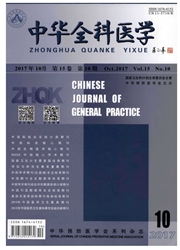

 中文摘要:
中文摘要:
目的分析腋窝淋巴结阴性乳腺癌患者的临床特点、治疗方法对预后的影响。方法‘收集普外科治疗的48例腋窝淋巴结阴性乳腺癌患者的临床资料,采用Kaplan.Meier曲线分析和多因素回归分析方法,对患者的生存情况及预后影响因素进行分析。结果单因素分析发现,年龄、淋巴结清扫数目、肿瘤大小、内分泌治疗与否、ER表达差异有统计学意义(P〈0.05)。将5个有统计学意义的单因素作为自变量,患者的无瘤生存时间作为应变量.采用Cox比例风险回归模型多因素分析,淋巴结清扫数目、肿瘤大小、内分泌治疗是淋巴结阴性乳腺癌患者预后的独立影响因素(P〈0.05)。结论原发肿瘤的大小和腋窝淋巴结清扫数目可评价病理分期的准确性,对于较大的乳腺癌患者应行较为彻底的淋巴结清扫。’
 英文摘要:
英文摘要:
Objective To investigate the clinical characteristics,effective treatment and prognosis of patients with node-nega- tive breast cancer. Methods The data of 48 patients with node-negative breast cancer were retrospectively reviewed. The survival rate was calculated by Kaplan-Meier methods and COX multivariate prognosis analysis was performed. Results The univariate a- nalysis showed that the differences in age, tumor size, number of dissected lymph nodes, adjuvant hormonal therapy and expression of EF were significant(P 〈 O. 05). Multivariate analysis showed that the number of lymph nodes dissected, tumor size, adjuvant hormonal therapy were prognostic factors of node-negative breast cancer ( P 〈 0.05 ). Conclusion The number of removed axilla- ry lymph node is an independent prognostic factor for node-negative breast cancer, which can reflect the thoroughness of the re- zional lymph node dissection in mastectomv.
 同期刊论文项目
同期刊论文项目
 同项目期刊论文
同项目期刊论文
 Combined treatment of glibenclamide and CoCl2 decreases MMP9 expression and inhibits growth in highl
Combined treatment of glibenclamide and CoCl2 decreases MMP9 expression and inhibits growth in highl 期刊信息
期刊信息
